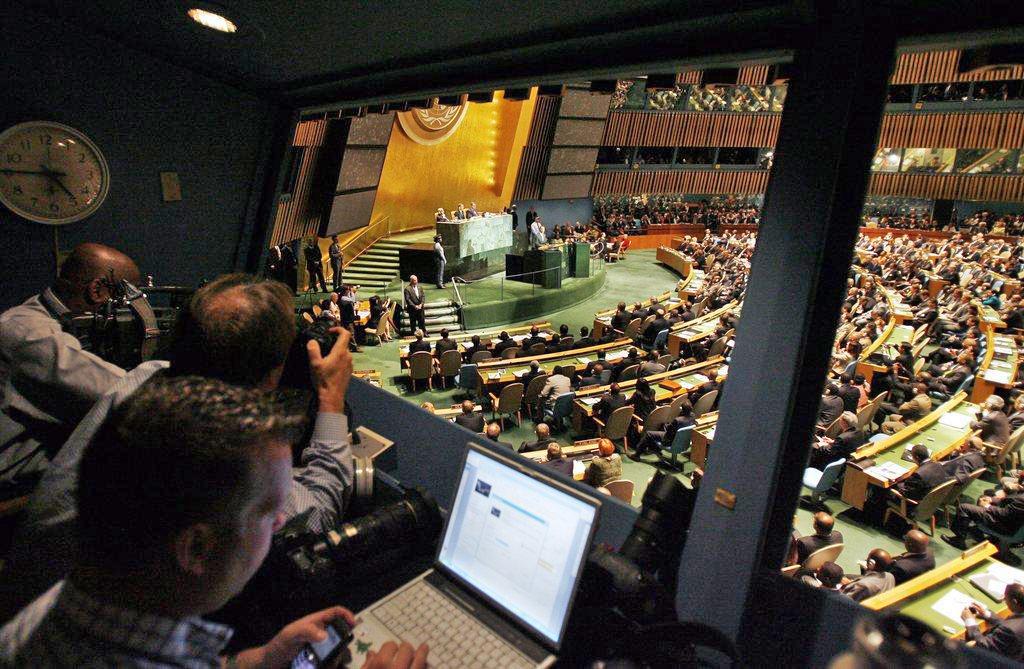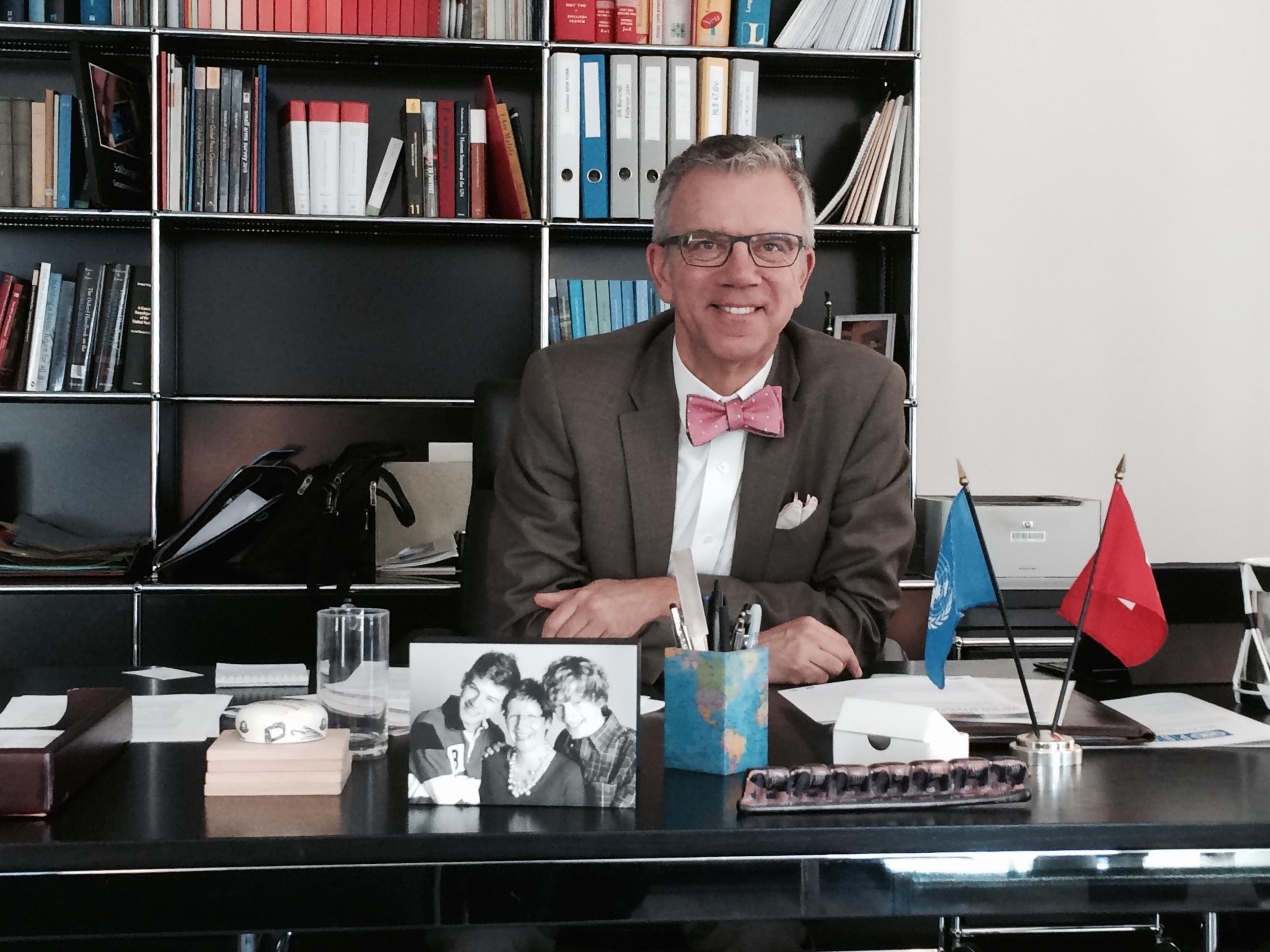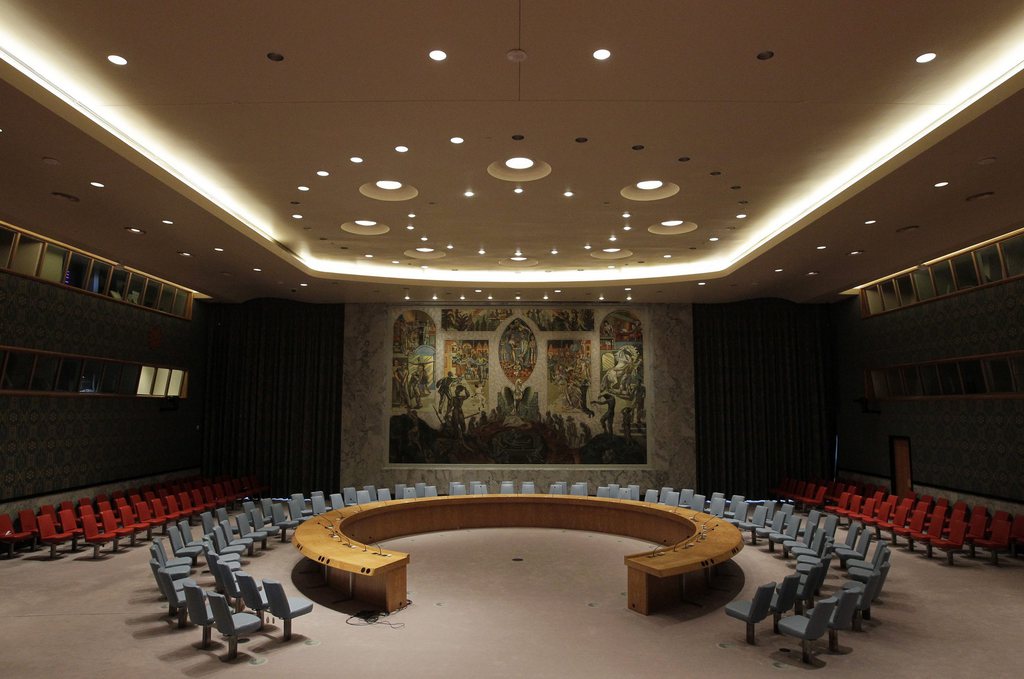UN leadership election needs reform, says Swiss-run group

United Nations Secretary-General Ban Ki-moon leaves his post at the end of 2016. Time now to change the opaque way the Secretary-General is appointed, says ACT, a Swiss-led group of UN member states looking at reform in the Security Council.
The procedure for the selection and appointment of the Secretary-GeneralExternal link of the United Nations lacks transparency and inclusiveness and a proper selection process, says Paul Seeger, Switzerland’s outgoing Ambassador to the UN in New York. “The appointment of the Secretary-General is less transparent than the election of the pope”, he told swissinfo.ch in a joint interview with the Swiss News Agency.
Under the heading “A call for ACTion”, Switzerland, as coordinator of the cross-regional group ACT (Accountability, Coherence, Transparency), organised a panel discussion at the UN in New York on June 30 and presented their proposals for improving the selection and appointment process. These proposals were also conveyed by letter to the presidents of the Security CouncilExternal link and the General AssemblyExternal link.
Article 97 of the UN CharterExternal link stipulates that the Secretary-General shall be appointed by the General Assembly upon recommendations of the Security Council. ACT does not want to change the existing stipulations, but believes that there is “much room for improvement in the transparency and inclusivity of the process”.
A growing number of UN member states as well as actors and organisations from the civil society are voicing their disappointment and disapproval with the current process and demand changes in the procedure. It’s often said that today, the Secretary-General is practically handpicked by the US, Russia and China – the three most powerful of the five permanent Members of the Security Council.
One for all
“The Secretary-General is not just the Secretary-General of those three permanent members, he’s the Secretary-General for all of the 193 member states, he stands for all of us,” said Paul Seger. “Therefore, it’s only legitimate that all 193 member states should have a say in the appointment. At least they must be better informed about who the candidates are.”

Through his office the Secretary-General is a person of high moral authority, and member states should be better informed about the selection and appointment process, said Seger.
“That’s why we launched a series of concrete proposals on how the next election should be structured, with a public posting of the job, a list of candidates, with public hearings, where the candidates can explain their motives, their visions for the UN, so all member states can get an idea who these people are, what their values are, what they stand for.”
“Switzerland and the other members of ACT believe that a more open, more transparent and inclusive process is better for the UN in the long run. With more transparency, credibility and trust will only grow. This thought motivates our actions. We really do hope we can bring more transparency to the selection and appointment process for the next Secretary-General.”
Gender balance
The participants in the panel discussion on ACT’s proposals included Mary Robinson, Ireland’s first woman president and former UN High Commissioner for Human Rights. She spoke for “The Elders”, an independent group of global leaders who no longer hold public office. They work for peace and human rights and were originally brought together in 2007 by Nelson MandelaExternal link.
Like ACT, the Elders have taken up the issue of the selection and appointment processExternal link for the Secretary-General.
ACT is a cross-regional group of 27 small and mid-sized countries trying to enhance the accountability, coherence and credibility of the UN Security Council. ACT was launched in May 2013 and addresses the Security Council’s internal functioning and its relations to the broader UN membership. ACT presents concrete and pragmatic proposals to improve the working methods of the Council in its present composition.
“The Secretary-General of the UN needs to be person with high moral authority, a person that can stand up for the poor, the marginalised, but also someone with great management skills”, said Robinson. She said the Elders called upon the UN member states to support a more transparent and inclusive process for the selection and appointment of the next Secretary-General.
“The proposals of ACT go a long way. But we need to be bolder still”, she said. “The Secretary-General is the representative of all people. Why not involve civil society more? It would be helpful, if the Security Council would submit more than just one name. The Secretary-General needs to be an independent person, someone not beholden to anyone. Therefore, we think a single, maybe longer term of seven years would be a better solution,” the former Irish president said. The current term is five years.
“Also, after eight Secretary-Generals it’s high time for a woman in the post – however, if a man turns out to be the best candidate, so be it,” she said, noting it would be of high symbolic value for the empowerment of women. Also, women often had a different way to govern, a more practical approach, she said.
“The changes we want in the selection and appointment process are doable, they’re doable this time around, they don’t entail any changes in the UN Charter. If the Security Council can be convinced to get on board, we can move forward now.” In the eyes of Robinson more transparency and structure in the process would also be a signal that the UN is capable of evolving when a system is not acceptable.
Enough talk
Also present on the panel was William Pace, executive director of the Institute for Global Policy, representing “1 for 7 Billion”External link, a campaign (for more democracy in the selection of the Secretary-General) supported by over 100 civil society organisations worldwide.
Like ACT and the Elders, the campaign deplores the lack of formal selection criteria, of a clear timetable with deadlines, of a public shortlist and a chance for all UN member states to hear from the candidates. The campaign also demands a single, non-renewable term for the post of Secretary-General to avoid electioneering and it deplores that so far no woman has ever been seriously considered for the post.
Pace said he hoped that after 20 years of talking about the problems of the process the UN member states and the Security Council would move generally “forward this year, so that the most highly qualified candidates have a chance to be found because millions of people rely on the UN to better their lives. It would be tragic if the states do not improve the process this time around”.
With Matthew Rycroft, the British Ambassador to the UN, one of the five permanent members of the Security Council was also present on the panel. Rycroft said the United Kingdom was in favour of reforms such as gender equality: “It’s high time for a woman to be considered.”
He also stated that the UK was in favour of a regular, reliable timetable and said he would try to get the Security Council to support changes such as these. And he voiced his support for a more transparent and inclusive process that would allow candidates to present themselves beyond UN headquarters and would also involve the civil society.
The proposals presented by ACT include:
Official call for nominations, to start the process in a transparent manner, e.g. through a letter by the General Assembly and the Security Council inviting UN member states to present nominations by a certain deadline. The letter should also strongly encourage member states to nominate qualified female candidates.
More active role for the General Assembly.
More public hearings, scope of consultations should be widened beyond Security Council members, the views of all member states should be considered.
More transparency within the Security Council: Meetings with shortlisted candidates, so that both permanent and elected Council members could make an informed decision on which candidate to support.
ACT also encourages public briefings in the Security Council about the development of the nomination process.
Due regard given to geographical distribution through rotation and gender balance.
ACT also thinks the term in office of the Secretary-General merits some discussion.

In compliance with the JTI standards
More: SWI swissinfo.ch certified by the Journalism Trust Initiative

You can find an overview of ongoing debates with our journalists here. Please join us!
If you want to start a conversation about a topic raised in this article or want to report factual errors, email us at english@swissinfo.ch.